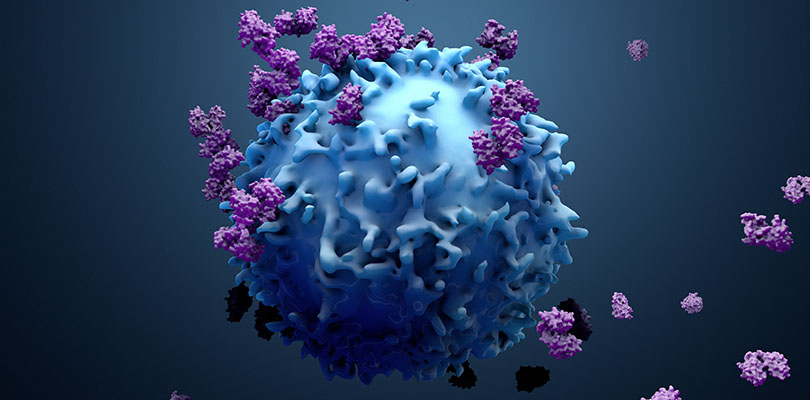About Thyroid Cancer
When cancer gets into your thyroid, it can cause havoc on hormones that are essential for proper bodily function. During proper operation, the thyroid calibrates these hormones to keep bodily functions and response in balance. If hormone balance is thrown off because of thyroid cancer, you need to know what your treatment options are so you can focus on being as healthy as possible.
What Is Thyroid Cancer?
Thyroid cancer is a type of cancer that occurs in the cells of the thyroid, a gland located at the base of your neck, underneath your Adam's apple.
The thyroid is the part of the endocrine system that produces hormones which regulate your heart rate, body temperature, blood pressure, and weight. It is consists of two parts: follicular cells (which make the thyroid hormones) and C cells (which control calcium levels in the blood).
Causes of Thyroid Cancer
The cause of thyroid cancer is not known. Cancer occurs when your cells mutate (in thyroid cancer, changes to the cells within the thyroid).
Mutations can cause cells to lose the ability to die off when they are old and damaged as they normally should. The mutations may also make it so that the cells grow and divide at a rapid pace, which creates overcrowding of cells that may eventually become a tumor.
Mutated cells aren't guaranteed to become cancerous, but benign cells aren't always innocent. Benign mutations may lead to hypothyroidism or hyperthyroidism, thyroid nodules, or goiter. Thyroid nodules are common, but they are not usually cancer.
The most significant risk factors for thyroid cancer are age (between 25-65 years old), gender (female), family history of thyroid disease or thyroid cancer, and exposure to radiation.
Symptoms of Thyroid Cancer
There aren't usually early signs or symptoms that you'll notice with this type of cancer. When the cancer takes over more of the body's real estate, you'll start to notice some of the following symptoms:
- A lump on your neck
- Difficulty swallowing
- Trouble breathing
- Pain in the neck and throat
- Swollen lymph nodes in your neck
- Hoarseness or changes to your voice
Types of Thyroid Cancer
- Papillary thyroid cancer is the most common type of thyroid cancer. It originates in the follicular cells that produce and store thyroid hormones.
- Follicular thyroid cancer is the second most common type of thyroid cancer. It also originates in the follicular cells.
- Medullary thyroid cancer begins in the thyroid's C cells.
- Anaplastic thyroid cancer is a rare type of thyroid cancer that is uncommon and difficult to treat.
- Thyroid lymphoma is another rare type of thyroid cancer, and it begins in the thyroid's immune system cells.
Tumors may be benign or malignant, and there are some important distinctions, especially when it comes to cancerous tumors.
Thyroid Cancer Treatment
Many cases of this thyroid cancer are cured with treatment. A patient's treatment depends on which type of thyroid cancer a person has and the stage of cancer.
This type of cancer can return, even if the thyroid has been removed. Before thyroid removal, microscopic cancer cells can spread outside of the thyroid, and they aren't extracted during surgery. New types of treatment are still in clinical trials, but research and studies are ongoing.
As with any medical treatment, side effects are a possibility; ask your doctor to lay out your options and the associated side effects for each one.
There are six standard cancer treatment options:
Surgery
The most common treatment, where the cancer-affected cells, lobe, part or all of the thyroid, is removed by a surgeon. Surgical procedures for thyroid cancer include lobectomy, near-total thyroidectomy, and total thyroidectomy.
Radiation therapy
High energy x-rays or radiation are used to kill cancer cells or inhibit their growth. Radiation therapy can be used in conjunction with surgery to kill any cancer cells that were not removed.
There are two types of radiation therapy: internal radiation therapy (radioactive material is placed directly into the cancer or the surrounding tissue) and external radiation therapy (delivers radiation through a machine outside the body).
Chemotherapy
Chemotherapy uses drugs to stop the growth of cancer cells by either killing the cells or preventing them from multiplying.
For treatments which are taken by mouth or injected into the vein/muscle, the chemotherapy drugs search out the cancer cells through the bloodstream.
In other treatments where chemotherapy is placed directly into the cerebrospinal fluid, an organ, or a body cavity, the drugs target the cancer cells in those areas.
Thyroid Hormone Therapy
Thyroid hormone therapy treatment can either add or removes hormones or prohibit their action. Regulating hormones like this can control some bodily functions, which include preventing cells from growing.
The drugs used in this treatment can control the thyroid-stimulating hormone (TSH). TSH regulates the growth of thyroid cancer cells, and hormone therapy can prevent these cells from growing.
Targeted Therapy
This treatment uses drugs to identify and attack specific cancer cells without affecting healthy cells. Tyrosine kinase inhibitor therapy blocks the signals for tumors to grow and protein kinase inhibitors block the proteins needed for cell growth (which may kill cancer cells).
Watchful Waiting
Watchful waiting is a wait-and-see approach, which is great if you're not sure how aggressive the cancer is or which of the other treatments would be the most effective. A patient's condition is closely monitored, and treatment isn't given until signs or symptoms appear or change.
Cancer is a scary word. Knowing the treatments that are available can help alleviate the fear and put cancer in its place.







